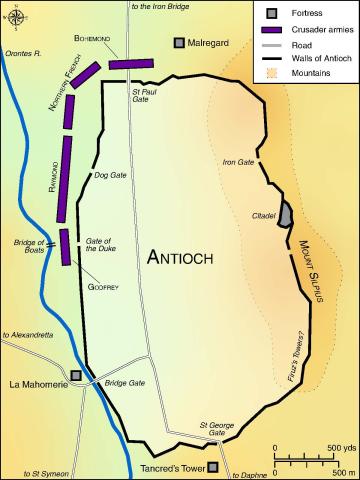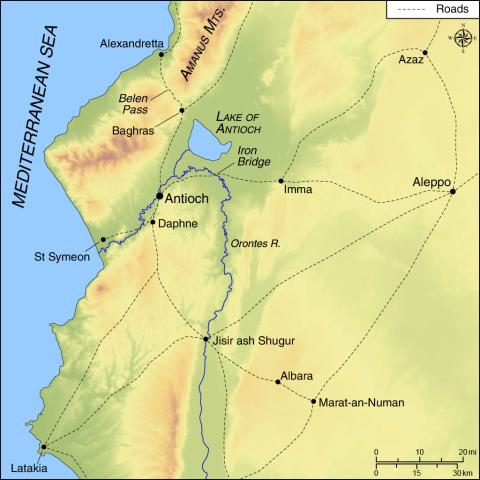The Crusaders Besiege Antioch
[7.18.1] Reversī sunt nostrī, agente Deō, triumphantēs et gaudentēs dē triumphō quem in diē illō habuērunt dēvictīs inimīcīs, quī sunt per omnia superātī semper, fugientēs hūc et illūc, vagantēs et errantēs, aliī in Corrozānam, aliī vērō in Saracēnōrum introiērunt terram. Videntēs autem nostrī māiōrēs quod male tractārent et cōnstringerent nōs inimīcī nostrī quī erant in cīvitāte (diē ac nocte vigilantēs et īnsidiantēs quā parte nōs laedere possent), congregātī in ūnum dīxērunt: “Priusquam perdāmus gentem nostram, faciāmus castrum ad machumāriam quae est ante urbis portam, ubi pōns est, ibique forsitan poterimus nostrōs cōnstringere inimīcōs.” Cōnsēnsērunt omnēs, et laudāvērunt quod bonum esset ad faciendum. Comes dē Sānctō Egidīō prīmus dīxit: “Ēstotē mihi in adiūtōrium ad faciendum castrum, et ego mūniam ac servābō.”
[7.18.2] Respondit Boamundus: “Sī vōs vultis et aliī, ībō vōbīscum ad portum Sānctī Simeōnis dīligenter condūcere illōs quī illīc sunt hominēs, ut peragant hōc opus; aliī, quī sunt remānsūrī, mūniant sē undique ad dēfendendum.” Comes igitur et Boamundus perrēxērunt ad Sānctī Simeōnis portum. Nōs vērō, quī remānsimus, congregātī in ūnum, castrum incipiēbāmus, dum Turcī preparāvērunt sē īlicō, et exiērunt extrā cīvitātem obviam nōbīs ad proelium. Sīc itaque irruērunt super nōs, et mīsērunt nostrōs in fugam, occīdēruntque plūrēs ex nostrīs, unde trīstēs valdē fuimus.
notes
(March 1098) Despite the crusader victory, the Turks in Antioch keep attacking. The crusaders decide to build a fort near the mosque facing the Bridge Gate, to keep the Turks inside the city. Raymond of Toulouse and Bohemond volunteer to build and hold this new fort. They go to the Port of St. Symeon to collect workers; the crusaders left behind are attacked.
7.18.1
quī sunt per omnia superātī: = qui per omnia superati sunt
per omnia: “completely.”
aliī in Corrozānam, aliī vērō in Saracēnōrum introiērunt terram: in theory this could mean "to Persia and Arabia," but our author is probably not being precise.
tractārent: the subject is inimici nostri, etc.
īnsidiantēs: "being on the lookout for," here governing an indirect question introduced by qua parte “where.”
castrum ad machumāriam quae est ante urbis portam, ubi pōns est: This fort, known as the Mahommeries Tower ("Mosque Tower," in Old French), was next to a mosque (machumaria) facing the Bridge Gate.
7.18.2
ad portum Sānctī Simeōnis: At the mouth of the Orontes River, about 20 km from Antioch, the modern Samandağ.
illōs quī illīc sunt hominēs: = illos homines qui sunt illic. An English fleet arrived at St. Symeon on March 4; its sailors and carpenters would have been helpful in the construction of the Mahommeries Tower
vocabulary
7.18.1
semper: every time (OLD 2); totally (ML)
īnsidior (1): to lie in ambush; to be on the look out for (OLD 5)
machumaria –ae, f.: mosque (ML)
7.18.2
portus –ūs, m.: harbor, port
peragō peragere perēgī peractum: to carry out; bring to completion
muniō munīre munīvī or muniī munītum: to fortify
īlicō: there, on the spot (OLD 1); at once, thereupon (OLD 2)


